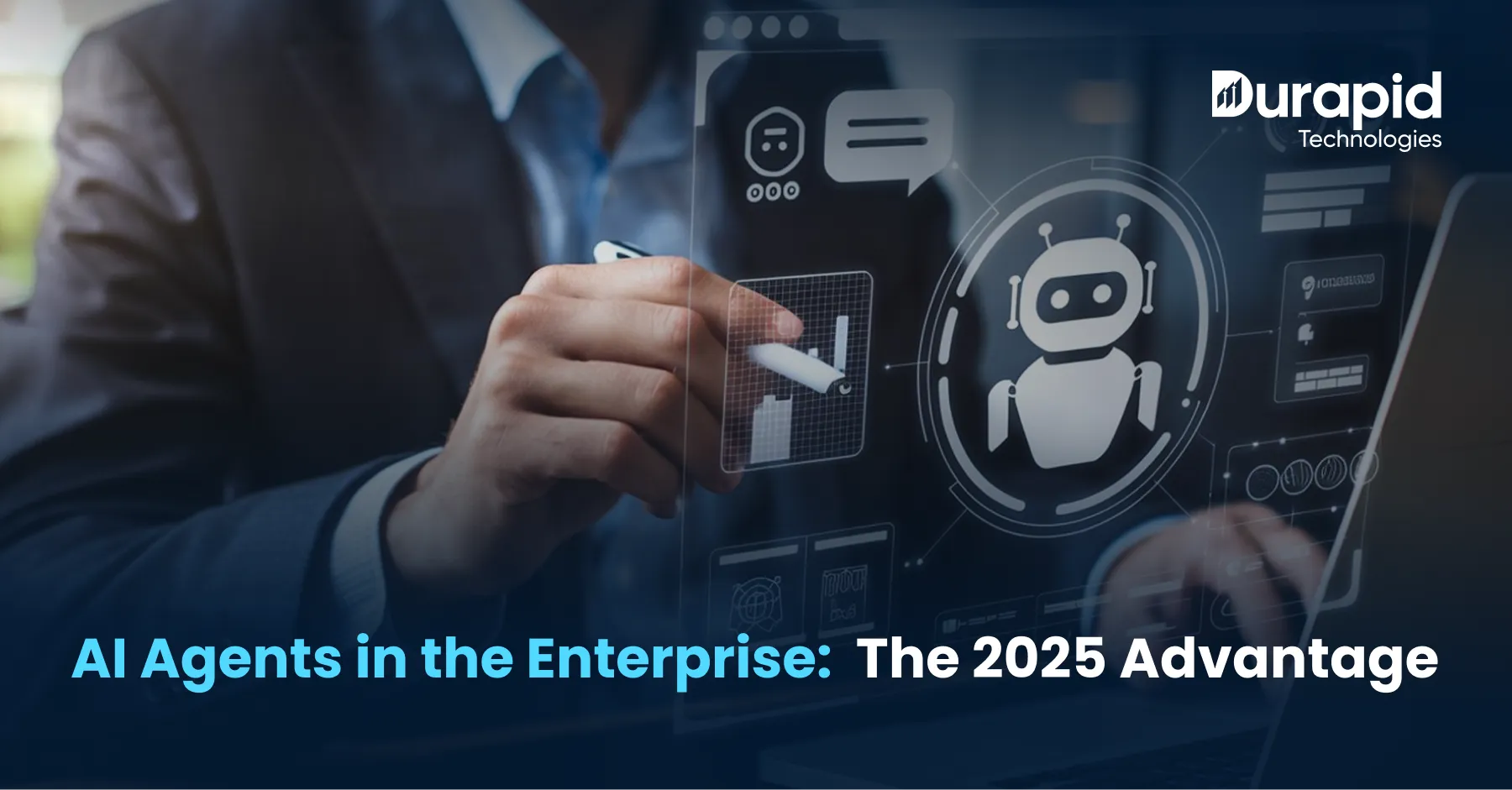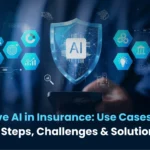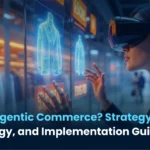AI Agents in the Enterprise: The 2025 Advantage

AI Agents in the Enterprise: The 2025 Advantage
Your IT team is drowning in tickets.
Your finance department is still manually reconciling invoices.
Your customer service reps are copy-pasting the same responses for the hundredth time today.
And somewhere, your CEO is asking why digital transformation feels like it’s moving at the speed of molasses.
Here’s the thing nobody wants to admit: most of our “AI transformation” has been pretty basic. Chatbots that can’t handle anything beyond FAQs. Analytics dashboards that look impressive but don’t actually do the work. Tools that promise automation but still need humans babysitting them 24/7.
But 2025 is different. We’re finally seeing enterprise AI agents that don’t just analyze or respond, they actually get stuff done.
What Are AI Agents?
Let me break this down without the buzzword bingo.
Traditional AI tools are like really smart interns. You give them specific instructions, they execute, and they come back for more instructions. Rinse and repeat.
AI agents? They’re more like your best employee who actually understands the business. You tell them the outcome you want, and they figure out the entire process to get there. They can:

→ Make decisions autonomously
→ Handle multi-step workflows
→ Learn from their mistakes
→ Adapt to changing conditions
→ Coordinate with other systems
The difference between current automation and agentic AI is simple: automation follows rules, agents achieve goals.
Think about it this way, your current workflow automation is like programming a coffee machine. Press button A, get result B. Every single time.
AI agents are like having a barista who knows you want your usual latte but notices you look tired today and suggests an extra shot, remembers you’re lactose intolerant on Mondays, and automatically adjusts your order based on what’s actually available in the shop.
That’s the shift happening in enterprises right now.
Business Use Cases in 2025
The real question isn’t whether AI agents work, it’s where they create the biggest impact.
Finance Operations That Actually Work
Remember when your finance team used to spend days on month-end closes? AI agents can now handle the entire reconciliation process. They pull data from multiple systems, identify discrepancies, automatically investigate variances, and only flag the exceptions that need human attention.
At Durapid Technologies, we’ve implemented agents that reduced credit risk assessment time from days to hours. The agents don’t just crunch numbers, they analyze market conditions, cross-reference historical data, and provide risk scoring with full audit trails.
Customer Service Without the Frustration
Everyone’s tried those chatbots that make you want to throw away your phone. AI agents in 2025 are different. They understand context, remember previous interactions, and can actually resolve complex issues.
We built an agent for a retail client that handles returns, exchanges, and warranty claims end-to-end. It processes refunds, updates inventory, triggers replacements, and sends personalized follow-ups. The customer service team went from handling routine requests to focusing on relationship building.
Supply Chain That Predicts Problems
Traditional supply chain systems tell you what happened. AI agents tell you what’s about to happen and fix it before you even notice.
One manufacturing client uses our agents to monitor supplier performance, predict delivery delays, automatically source alternatives, and renegotiate terms when market conditions change. The system prevented three major production shutdowns last quarter.
IT Operations That Don’t Need You at 3 AM
Your infrastructure shouldn’t wake you up anymore. AI agents can detect anomalies, diagnose root causes, implement fixes, and document everything, all while you sleep.
We’ve deployed agents that handle 85% of Level 1 and Level 2 support tickets without human intervention. They create tickets, assign priorities, execute remediation scripts, and update stakeholders throughout the process.
Wins & Risks for Enterprises
Let’s get real about what you’re actually signing up for.
The Wins Are Real
ROI isn’t theoretical anymore. Organizations implementing AI agents report:
→ 40-60% reduction in operational costs for routine tasks → 70% faster processing times for complex workflows
→ 90% improvement in accuracy for data-heavy processes → 24/7 operations without scaling headcount
But here’s what surprises most executives: the productivity gains compound. When your agents handle the routine stuff, your human teams can focus on strategy, innovation, and relationship building. That’s where the real competitive advantage comes from.
The Risks You Need to Know About
AI agents aren’t magic. They can make expensive mistakes at scale if not properly governed.
Security is the big one. These agents often need access to multiple systems and sensitive data. One misconfigured agent could expose customer information or financial data. That’s why our implementation approach at Durapid includes security-first design and continuous monitoring.
Then there’s the integration complexity. Your enterprise systems weren’t designed to work with autonomous agents. Legacy applications, data silos, and inconsistent APIs can turn implementation into a nightmare.
The human factor is trickier than technology. Your teams need to learn new ways of working. Some roles will change dramatically, others will be enhanced. Change management isn’t optional, it’s critical.
Evaluating Leading AI Agent Platforms
The market is moving fast, and not all platforms are created equal.

Microsoft’s Copilot Studio integrates seamlessly if you’re already in the Microsoft ecosystem. It works particularly well with Teams, SharePoint, and Dynamics 365. The learning curve is lower, but customization options are somewhat limited.
OpenAI’s API ecosystem offers more flexibility for custom implementations. We use this for clients who need highly specialized agents. The development effort is higher, but the results are more tailored.
Databricks’ MLflow is excellent for data-heavy use cases. If your agents need to process large datasets or perform complex analytics, this platform shines. Integration with Azure Synapse makes it particularly powerful for our enterprise clients.
Azure Cognitive Services provides pre-built capabilities for common use cases like document processing, speech analytics, and vision tasks. It’s a good starting point for organizations new to AI agents.
The platform choice depends on your existing infrastructure, use case complexity, and internal capabilities. There’s no one-size-fits-all answer.
Steps for CIOs in Adoption
Here’s the roadmap that actually works, based on 35+ implementations we’ve done at Durapid:

Start with High-Impact, Low-Risk Use Cases
Don’t begin with mission-critical processes. Pick something important but not catastrophic if it fails. Invoice processing, employee onboarding, or inventory management are good starting points.
Invest in Data Quality First
AI agents are only as good as the data they work with. Clean, standardized, accessible data isn’t optional, it’s the foundation everything else builds on.
Build Governance Early
Establish clear policies for agent behavior, escalation procedures, and audit trails before deployment. It’s much harder to retrofit governance after agents are running in production.
Plan for Integration Complexity
Your existing systems probably don’t have APIs designed for AI agents. Budget for middleware, data transformation, and custom connectors. This often takes longer than expected.
Train Your Teams
Your people need to understand how to work with agents, not just alongside them. Provide training on prompt engineering, workflow design, and agent monitoring.
Start Small, Scale Fast
Prove value with a pilot before enterprise-wide deployment. But once you prove ROI, move quickly. The competitive advantage comes from scale and network effects.
The Reality Check
AI agents aren’t going to replace your workforce overnight. They’re going to transform how work gets done.
The companies that win in 2025 will be the ones that figure out this transformation early. They’ll operate faster, more efficiently, and with better customer experiences than competitors still stuck in manual processes.
But transformation requires commitment. Half-hearted implementations fail. You need executive buy-in, proper investment, and realistic timelines.
The technology is ready. The question is whether your organization is.
At Durapid Technologies, we’ve seen firsthand how AI agents change businesses. Our 300+ skilled developers have built agents for financial services, healthcare, manufacturing, and retail. The results consistently exceed expectations when implemented properly.
The 2025 advantage isn’t about having AI agents, it’s about having them work seamlessly within your existing operations while preparing your organization for the next wave of automation.
Your competitors are already evaluating this technology. The question isn’t whether to adopt AI agents, but how quickly you can do it right.
The future of enterprise operations is autonomous, intelligent, and available 24/7. The companies that embrace this shift will define the competitive landscape for the next decade.
Frequently Asked Questions
What makes agentic AI different from current automation?
Current automation follows pre-programmed rules and workflows. If condition A happens, do action B. Agentic AI sets goals and figures out how to achieve them autonomously. It can adapt to new situations, make decisions based on context, and learn from outcomes to improve future performance.
How secure are enterprise AI agents?
Security depends entirely on implementation. AI agents need access to systems and data to be effective, which creates potential vulnerabilities. Proper security includes role-based access controls, audit trails, encryption of all communications, continuous monitoring, and fail-safe mechanisms. At Durapid, we implement zero-trust architectures and security-first design principles.
What’s the ROI of agentic AI?
ROI varies by use case, but typical implementations show 40-60% reduction in operational costs, 70% faster processing times, and 90% improvement in accuracy. The real value comes from compounding effects, when agents handle routine work, human teams focus on higher-value activities. Most clients see positive ROI within 6-12 months of proper implementation.
Ready to explore AI agents for your enterprise? Durapid Technologies has helped 35+ organizations successfully implement agentic AI solutions. Contact us at sales@durapid.com or visit www.durapid.com to discuss your transformation strategy.




